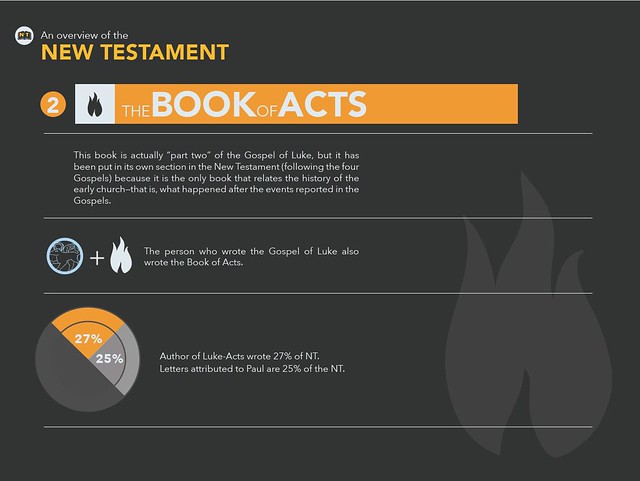Introducing the New Testament, 2nd Edition
A Historical, Literary, and Theological Survey
10. Acts
Video Introduction
Summary
This chapter offers an overview of the contents of the book of Acts, followed by discussion of that book’s historical background, genre, and major themes.
In terms of historical background, the book of Acts was written by the author of Luke’s Gospel and may be read as a continuation or second volume to that work. Most scholars date the work to the decade of the 80s, and many respect its apparent claim to be written by someone who accompanied the apostle Paul on some of his travels.
In terms of genre, the book of Acts fits into the basic category of “general history” and may be compared to other ancient historical works. It does not, however, accord with modern standards for historical reporting, and scholars sometimes question the reliability of Acts as a reference work for understanding early Christianity.
The theology of Acts focuses, first, on God as having sovereign control over all of history. God sometimes guides people by revealing what has been predestined. God has also proven faithful in keeping promises; thus, the transfer of divine blessings from Israel to gentiles must be understood as a consequence of Israel’s rebelliousness and not of God’s unfaithfulness. The book of Acts does emphasize that a remnant of Israel continues to be faithful, and the book presents Jerusalem as the center of the Christian movement. The book of Acts also presents Jesus as still present within the church, and it links reception of present and future salvation to him. Much of Acts is taken up with an enthusiastic account of the church at work in the world, a mission that is marked by charismatic manifestations of the Holy Spirit, miracles, numerical growth, and victorious, triumphant living.
Study Questions
Why did the author of Luke’s Gospel write a second volume? Give five reasons that have been suggested for why Luke wrote the book of Acts.
What problems attend scholars who want to use Acts as a resource for understanding early Christianity? Give an example of one way in which Acts seems to prove reliable and another example of a way in which the reliability of Acts has been questioned.
What implications does the author of Acts draw from his belief that historical events have all been predetermined? How does this belief affect his theological understanding of God, of Scripture, and of what faithful people can or should expect of God?
How does the book of Acts deal with the theological problem posed by Israel’s rejection of Jesus and the concomitant acceptance of Christ by gentiles?
What is meant by “Lukan generosity”? Give three examples of how this theme can be seen in the book of Acts.
List four ways in which the book of Acts depicts Jesus as still present on earth after his ascension into heaven. How do these modes of Christ’s presence relate to Luke’s notion of salvation?
What does the Holy Spirit do in the book of Acts? Give three examples.
List three ways in which followers of Jesus are often depicted as being “like their master” in the book of Acts? What theological problem has this depiction of Christ-like disciples posed for some Christians and how is that problem sometimes resolved?
Explore Readings
These readings provide a chance for you to explore the New Testament in more depth. The boxes from the text are included here, as well as bibliographies and outlines for the books of the New Testament.
All the Explore readings can also be downloaded as PDFs here.
10.1. Content Summary: Expanded Overview of the Book of Acts
10.6. Parallels between Luke’s Gospel and the Book of Acts (Box 10.4)
10.31. The Community of Luke: Clues from the Gospel and Acts
10.32. Potential Discrepancies between the Book of Acts and Paul’s Letters (Box 10.2)
10.35. Acts 10:34–35—“No Respecter of Persons” in American Democracy
Video: Cosmology in the New Testament World
Assets
-
10.0. Acts: Outline of ContentsDownload
-
10.1. Content Summary: Expanded Overview of the Book of ActsDownload
-
10.2. Acts in the Revised Common LectionaryDownload
-
10.3. Bibliography: The Book of ActsDownload
-
10.4. Distinctive Characteristics of the Book of ActsDownload
-
10.5. The "We" Passages in the Book of ActsDownload
-
10.7. Roman Rulers Mentioned in the Book of ActsDownload
-
10.8. Speeches in the Book of ActsDownload
-
10.9. Miracles in ActsDownload
-
10.12. People in the Book of ActsDownload
-
10.13. ApollosDownload
-
10.14. BarnabasDownload
-
10.16. Philip the Evangelist (or Philip the Deacon)Download
-
10.17. The Twelve DisciplesDownload
-
10.18. The Name of Jesus in the Book of ActsDownload
-
10.19. The Ministry of Peter in the Book of ActsDownload
-
10.22. Prison Conditions in the Roman WorldDownload
-
10.23. Speaking in Tongues in Acts and 1 CorinthiansDownload
-
10.24. Stoning A Form of Capital PunishmentDownload
-
10.26. Acts 17.27-28--Paul Quotes the PagansDownload
-
10.27. Acts 19.23-41--Temple of ArtemisDownload
-
10.28. Acts 21.37-39--Mistaken for an EgyptianDownload
-
10.29. The Apostles as “Ordinary Men” (Church Tradition)Download
-
10.31. The Community of Luke: Clues from the Gospel and ActsDownload
-
10.34. Acts 9--“Conversion” of PaulDownload
-
10.35. Acts 10.34-35--“No Respecter of Persons” in American DemocracyDownload
-
10.6. Parallels between Luke's Gospel and the Book of Acts (Box 10.4)Download
-
10.10. Salvation in the Book of Acts (Box 10.6)Download
-
10.11. Church of Joy (Box 10.7)Download
-
10.15. James and the Other Brothers of Jesus (Box 25.1)Download
-
10.20. The Centrality of Jerusalem in Luke-Acts (Box 10.5)Download
-
10.21. How to Write Speeches (Thucydides) (Box 10.3)Download
-
10.25. Friendship and Sharing (18.6)Download
-
10.30. Possible Sources for Acts (Box 10.1)Download
-
10.32. Potential Discrepancies between the Book of Acts and Paul's Letters (Box 10.2)Download
-
10.33. Acts 15:1-32--What to Do with Gentiles (Box 16.6)Download
-
Map 10.2. Paul’s Second Missionary JourneyDownload
-
Map 10.3. Paul’s Third Missionary JourneyDownload
-
Map 10.4. Paul’s Journey to RomeDownload

